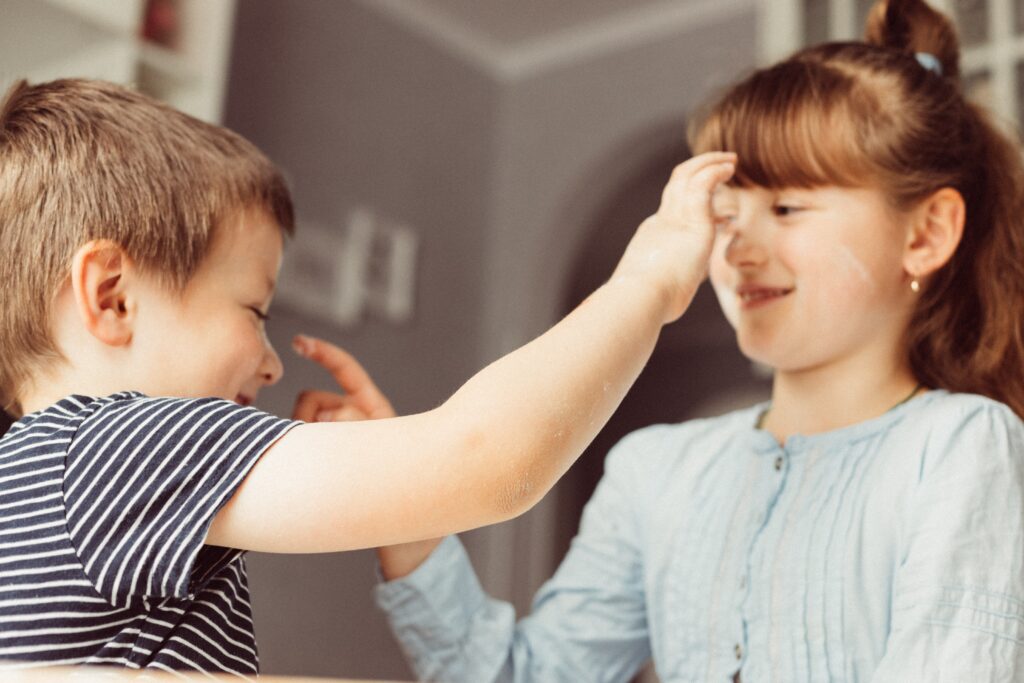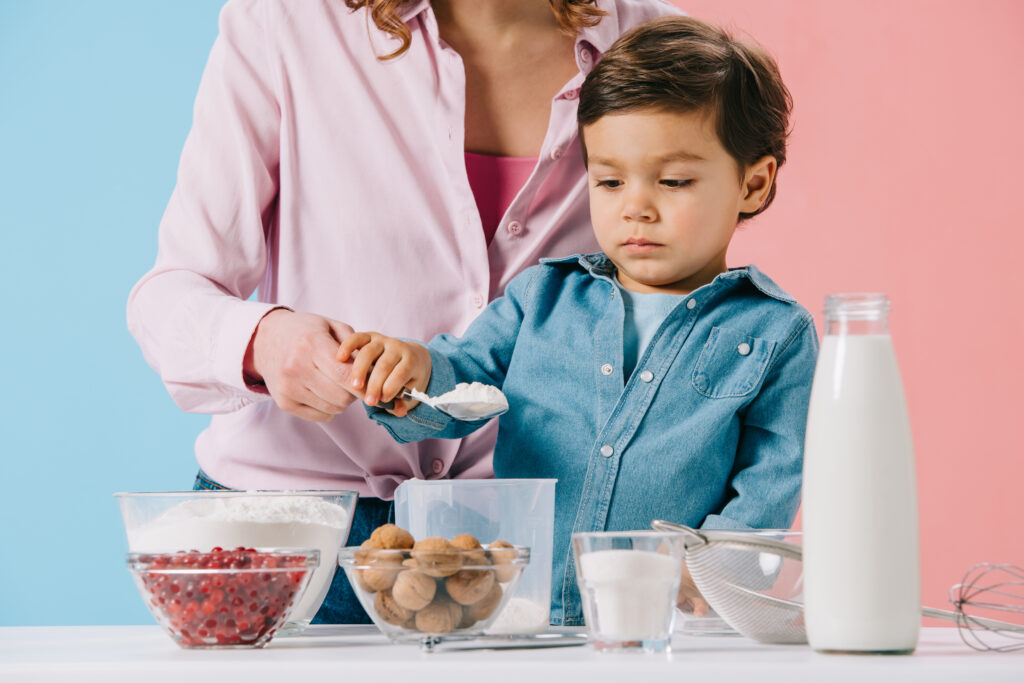How to Handle Sibling Rivalry with Conscious Parenting

Fights between siblings are a big (and tiring) part of family life. It can be a fight over a toy. It can be a loud yelling match. A lot of parents don’t know when to get in, how to be fair, or how to stop it from getting worse. But here is what I see all the time as a Child Development Specialist These fights don’t mean your children don’t love each other. It shows they’re figuring out how to handle sibling strong emotions with those closest to them, and with the tools of conscious parenting, you can help them develop empathy, speak kindly, and strengthen their bond instead of fighting. Let’s look at how to change these fights into chances for Holistic Child Development through mindful parenting. 1. Don’t Rush to Judge — Show You See Their Feelings First The first thing we want to do as parents is be the judge: “Who did it first?” “Why did you hit him?” But blaming just makes things worse. It can make one child feel unheard. Respond to both with empathy and patience, use Nonviolent Communication to show you see how they feel. Don’t excuse bad and unpleasant behaviour. Try this: “I can see you are both very angry right now. Let’s take a slow breath. Then we can find out what each of you needs.” This small change helps kids feel safe with their feelings. It shows them Emotional Regulation. This is a key part of Holistic Child Development. 2. Use Family Meetings to Build a Close Feel Most of us only talk about our feelings when there’s already a problem, but you can express your feelings each week in the Family Meeting. These planned talks are a great way to use Active Listening Parenting. They give each child a say in the family. You can add easy toddler activities like drawing their feelings or acting out solutions through play. When kids know they can show how they feel in a good way, the bad feelings towards each other will go down over time. Studies say sibling who feel seen and heard at home are kinder to their brothers or sisters. They can learn to resolve disagreements on their own. 3. Teach How to Work Together, Not Just “Share” True sharing develops with maturity; it can’t be forced. Do not just think about what is fair right now. Think about how to make them understand the importance of cooperation. Use Positive discipline strategies for toddlers to show them the way. For example: “Let’s use a timer to take turns with the toy. Then we can talk about how it felt to wait and then to play.” Also, use mindful parenting. See if your feelings about their fights come from your past or stress. When you are calm, your kids learn to be calm in a fight, too. Conclusion: Conscious Co-Parenting for Strong Sibling Ties Fights between sibling aren’t something to fear; they’re part of growing. They are a thing to guide. When we use conscious co-parenting, we stop trying to make kids act a certain way. We try to see why they act that way. We are the conscious parents our kids need. This helps them not just get through the fights, but also do well with their big feelings. Tip: Try a “special time jar.” Let each child pick one thing to do with you each week. This makes their tie to you strong. It cuts down on the fight for your time. Don’t forget to follow us on Instagram, and YouTube for more ideas and help. For new things, click here to see our recent press releases.Are you ready to learn more about how to use conscious parenting techniques at home? Look at our talks for help, our class plans, and some of the Best Parenting Books on the topic at Vedangi Brahmbhatt’s website.
Parenting Without Yelling: Ways That Work

Let’s be real. Parenting isn’t easy, but it can also feel overwhelming. Your child may throw food. They may cry a lot at bedtime. You’re exhausted. They’re exhausted. Sometimes it seems like raising your voice is the only option, but it rarely helps children learn or grow. It just makes things worse. You know there is a better way. As a Child Development Specialist, I work with families who want to nurture confident, emotionally healthy, and happy children. They do not want to yell at or punish you. The good news is that you can nurture your child with compassion while keeping fair rules. It starts with you, a plan, and a few practical approaches that work every day. 1. Pause, breathe, then respond It’s not about never feeling angry, it’s about guiding it into constructive action. A great tool in mindful parenting is to wait before you act. This short time lets you calm down. It stops you from just yelling out. Try this: When you feel the urge to yell, place your hand on your heart and take three deep breaths. You’re not ignoring the problem—you’re simply calming yourself before responding. This shows your child’s emotional regulation. When you do this a lot, your child learns it too. This is a big part of holistic child development. 2. Replace yelling with nonviolent communication. When a child acts out, it is often a cry for help. They may not have the words to say what they need. Act with intention, not with anger. Use Nonviolent Communication to see what they need and show that you understand. Example: Instead of yelling, “Why are you so messy all the time?” Try: “I feel sad when I see toys all over.” I like a clean room. Can we clean up as a team after this game?” This also helps with Active Listening Parenting. Your child will feel truly seen and heard, not judged or embarrassed. 3. Create rituals that reinforce connection and boundaries Ways of stopping problems are as important as ways to fix them. One easy but strong tool is a family meeting. This is a check-in each week. Everyone in the home can share their feelings, express their worries, and talk about the positives. This helps with conscious co-parenting. It shows kids how to work as a team to fix problems. Make routines fun by including simple, enjoyable activity sets for your toddler. This gives your child a plan and a feeling that they are part of the family. A child who feels close to you is less likely to “act out.” A study shows that when you are in tune with a young child’s feelings, they grow up with better self-control. These are the outcomes we hope to see from positive discipline strategies for toddlers. Conclusion: Yelling Isn’t the Only Option Yelling doesn’t make you a bad parent, it means you’re human. But if you’re reading this, you’re already taking the first step toward change. You can be the conscious parent your child needs. Tip: Develop a ‘calm plan’ together, so when emotions are out of control, you both know it’s time to pause. Only after you’re both calm, you can talk things through. This plan gives you both a tool to use when feelings seem uncontrollable. Remember this: you are not on your own. We can help you. Our conversations are guided by the ideas of Conscious Co-Parenting NJ. We also draw on proven strategies from some of the best parenting books available. Don’t forget to follow us on Instagram, and YouTube for more good ideas. For new news, click here to see our most recent press releases.
How to Build a Strong Emotional Bond With Your Child

A child feels safe when there is a link to you. As a child development specialist, I know this to be true: strong bond are built in the small, everyday moments—not just the big ones. The bedtime talk. It’s in the moments when we stop and truly listen to them. The small things we do time and time again that say, “I see you.” I LOVE YOU.” Parenting can be really difficult at times. In the first years filled with all sorts of toddler activities, spilled food, and big feelings, this might feel like a lot. But a good link does not ask you to be perfect. It asks you to be present. Here is how you can start growing a strong bond with your child today. 1. Make Time to Be Close Every Day In our fast-paced world, it is really difficult to slow down. But a bond grows through planned, repeated times of being close. I call them “feeling check-ins.” These can be simple things like: These moments create a sense of safe, steady love and build trust over time. They can also help with holistic child development, where a child’s heart, mind, and way of communicating with others all grow at the same time. When life feels overwhelming, start with one daily habit that matters most. It could be a song you sing in the shower or “finish your child’s day on a note of gratitude. At bedtime, gently invite them to share something they’re glad about. It could be a small win. 2. Here to Know, Not to Fix Children don’t always need us to fix their problems — sometimes, they just need to feel truly seen, heard, and understood. Instead of: “You’re fine, it’s not a big deal,” Try: “That made you feel very sad, didn’t it? I’m here for you.” This approach, inspired by nonviolent communication, is a beautiful way to strengthen your bond with your child. It’s about letting them know their feelings are welcome And so? Kids feel safe in their feelings. They are more ready to open up. This is one of the key benefits of mindful parenting for child development—kids learn to understand their feelings and get to know themself when you are there for them. 3. Guide with Care, not Fear To guide is often not seen with the right perspective. It means “to teach,” not “to punish.” Using positive discipline strategies for toddlers means you set clear rules with warmth and care. For example, “It’s okay to be mad, but it’s not okay to hit.” Let’s take deep breaths as one.” This way it fits with the idea of conscious parenting—“A mindful parent is someone who notices what’s driving their reactions, takes a pause before responding, and chooses to lead through their own example. This is especially important when parents live in two different homes. When you deal with intense emotions or fights, leading with a kind heart builds credibility. That is where the strongest bonds reside. Real-time insight A 2024 U.S. study found that children who felt emotionally close to at least one parent were 42% more likely to excel in school and 52% more likely to resolve conflicts with friends without harm That is the true power of a close bond. It sets your child up for a life by filling their hearts with strength and resilience. Conclusion: The Strong Bond Starts with You It’s not about doing everything perfectly; it’s about being there, time after time. Tip: Make a “bonding jar.” Put small pieces of paper in it through small, everyday actions that build closeness. Like reading a book, looking at the stars, or performing a toddler activity like sorting things by color. Let your child pick one each day. It is fun and a valuable lesson. The path of mindful parenting continues. Together, keep learning, bonding, and growing. Don’t forget to follow us on Instagram, and YouTube for more ideas. For the latest news, click here to view our recent press releases.
How to Help Your Child with Big Feelings and Not Act Fast

If you are a parent, you have seen all of your child’s feelings. Tears for the wrong bowl. Being upset at bed time. Or mad when they have to share. In those hard times, it is easy to act fast. But what if you chose to help, not just act? As a Child Development Specialist, I have helped many parents in the U.S. and other places use mindful parenting. This way helps you be calm even when your child is not. I will show you how to deal with your own feelings and help your child with their big feelings. This helps you both feel close and helps with emotional regulation. 1. Pause First, Act Later It may sound easy, but to pause first is a big help. Big feelings can come from a need. They may be hungry or tired. Or there is too much going on. When a child’s head is full of big feelings, they can’t think well. They need to feel safe and close to you. As the conscious parent, your job is not to fix the feeling. Your job is to be calm with them. Try this: Put your hand on your heart when your child is upset. Count to five in your head. This can help calm your body down so you can show them how to be calm. 2. Show You See, Don’t Make It Small Did you ever say, “It’s not a big deal”? Then the big feelings got worse. That is because to them, it is a big deal. Active Listening Parenting is when you say back what your child feels. You can say it even if the feeling seems too big. This is the base of Nonviolent Communication. You show you see their feeling. You don’t make them feel bad or wrong now. You teach your child that feelings are okay. You show them it is safe to show how they feel. This helps with emotional regulation kids can learn for life. 3. Make Rules with Love Being kind does not mean there are no rules. Kids do well when they have rules, more so when rules are set with love. Example: “It is okay to be mad, but it is not okay to hit. Let’s use our words or take a break.” This is part of positive discipline strategies for toddlers. You teach, not punish. You are still the conscious parent. You lead, but you don’t force. Over time, this makes Holistic Child Development. They learn about feelings, and they learn to care, talk, and be strong. A Look at Parents Now A 2023 report from the American Psychological Association said that 7 out of 10 parents in the U.S. say they act on their feelings in hard times with their kids. But kids whose parents are calm and kind have been shown to feel good about who they are. They do better in school. They are good with other kids. That is the real power of how to implement conscious parenting techniques at home. It is not just for now. It is for how they grow and feel for a long time. To End: Helping is the New Way No one is a perfect parent. We all have times when we use a loud voice or feel it is all too much. But each time you are close is a time to teach your child. You can teach them that feelings are not to be feared. They are for us to know more. Tip: Put a “Feelings Chart” on your fridge. It helps your child name their feeling. It gives you a picture to help you start a calm talk. Don’t forget to follow us on Instagram, and YouTube for more ideas and help to raise kids who are smart about feelings. For new news, click here to see our new press releases.
How to Really Listen to Your Child: The Art of Conscious Communication

Are you ever busy with a job—like making food or work—when your child comes to tell you a big thing? You nod and say “uh-huh,” but their eyes stay on you. They wait for you to really look at them. That look is a sign. Your child does not just want to talk. They want to be heard. As a Child Development Specialist, I see now that one of the best gifts we can give our kids is our full time and care. To give your time and care is not just to be in the same room. It is to join in with Active Listening Parenting, show you see their feelings, and use what I call Conscious paranting. Here, we will look at how to be the conscious parent. A parent who listens with care, gives kind words back, and builds a life of trust with their child. 1. Listening Is More Than Hearing Hearing just happens. Listening is work. It is to use your ears, eyes, and heart. When your child talks, do you look at them? Do you stop what you do? Do you show that you see how they feel? Like this: “You look very sad your toys fell. That must feel bad.” That is Nonviolent Communication. You show you see their feelings. You do not judge or fix them. This is a key part of mindful parenting. With it, your time and care mean more than being right. Life shows that kids who feel heard have a good hold on their feelings. They can also work out hard things as they grow up. This is called Emotional Regulation. 2. Ask, Don’t Tell When your child tells you a thing—a big thing—you may want to give help or fix it. But most of the time, they just want you to know how they feel. Try to ask questions that need more than a yes or no: This lets them talk more. It helps them find words for their feelings. This is a main part of Holistic Child Development. In Family Meeting times I have led, parents who do this all the time see a big change. Their kids talk more and end fights in a good way. It is also a key rule for conscious co-parenting like we teach at Vedangi Brahmbhatt. 3. Make Times to Talk Some of the best talks can be had in day-to-day life. It can be in the bath, in the car, or when you make food. These are good times for Toddler Activities. You can add set times to check in. One way is to ask for one good thing and one hard thing from the day. These small habits can help all kids share more. They show the benefits of mindful parenting for child development and help kids feel safe. Tip: Make a “listen time” for 5 minutes each day. Your child talks and you just listen. Do not stop them, give help, or do other work. It is a very good thing to do. Real-Time Insight: A new look at life in 2024 shows that homes that use listening and kind talk each day have far less bad ways of acting out. This shows how to implement conscious parenting techniques at home is not just an idea—it brings a very big change. Conclusion: A Tool for Life Kids do not need us to know all the things. They need us to be there for them. To make space for their big questions, what they fear, and their joy. When we use conscious communication, we build trust. We help them feel good about who they are. We help them be strong inside. Parenting Tip: When feelings are big, try to say their words back to them. It shows you love them and are with them. It helps them to keep on with their story. Don’t forget to follow us on Instagram, and YouTube for more on mindful parenting and conscious communication. For the latest news, click here to view our recent press releases.
Helping Your Child Develop Self-Regulation Skills

We’ve all been there—your child is mid-meltdown in the grocery store aisle, or maybe they’re lashing out at a sibling after a long school day. It’s in these challenging moments that the magic of self-regulation can make all the difference. And while emotional control may not come naturally to kids (or adults!), it is a learned skill—and one that begins at home. As a Child Development Specialist, I often remind parents that our job isn’t to create perfect children, but to model and guide them toward emotional intelligence. In this blog, we’ll dive into what self-regulation really means, why it’s essential, and how to help your child build it in everyday life. 1. Start Early with Routine & Predictability Self-regulation is the ability to manage one’s emotions, behavior, and energy levels in response to a situation. It begins with a sense of structure and security. a. Use Toddler Activities to Teach Patience Simple games like “Simon Says” or puzzles teach children to wait, listen, and follow directions. These fun exercises lay the foundation for impulse control. b. Schedule Regular Family Meetings Carve out time each week to talk about feelings, conflicts, and achievements. Giving kids a voice helps them name their emotions and feel validated, while reinforcing routines and mutual respect. c. Consistency Creates Calm Children thrive on predictability. Mealtime routines, bedtime rituals, and morning check-ins are all gentle ways to reinforce calm and prepare them to self-regulate during transitions. 2. Be a Role Model of Regulation Whether we like it or not, our children are always watching. How we handle stress teaches them how to handle theirs. a. Embrace Mindful Parenting Take a deep breath before reacting. Pause when you’re angry. These simple acts show children that emotions are okay, but so is slowing down to respond thoughtfully. b. Practice Nonviolent Communication Instead of “Stop yelling,” try “I hear you’re upset, let’s talk about it calmly.” Language shapes reality. Reframing correction with kindness helps teach your child better coping strategies. c. Encourage Active Listening Parenting When your child is venting, resist the urge to interrupt or problem-solve right away. Just listen. You’d be surprised how powerful your undivided attention can be in de-escalating big emotions. 3. Teach Regulation Through Connection Children learn to regulate when they feel connected, seen, and safe. a. Build Skills with Play Games that involve waiting turns, following rules, or role-play (like doctor or restaurant) encourage empathy and cognitive control—cornerstones of emotional regulation kids need. b. Promote Holistic Child Development Focus on the whole child—emotionally, socially, and cognitively. Sleep, diet, physical activity, and safe relationships all contribute to a child’s ability to regulate themselves. c. Explore Resources Like Best Parenting Books Books like “The Whole-Brain Child” or “No-Drama Discipline” offer evidence-based techniques that align with how to implement conscious parenting techniques at home and support positive discipline strategies for toddlers. Real-Time Insight According to the CDC, children with strong self-regulation are 2x more likely to perform well in school and develop healthy relationships. But only about 40% of U.S. children under 6 demonstrate age-appropriate self-regulation skills. This underscores the need for early, intentional support. Conclusion: It Starts With You Self-regulation doesn’t develop overnight. But with patience, empathy, and the conscious parent mindset, you can help your child thrive emotionally and socially. Your presence and guidance matter more than perfection ever could. Tip: Create a “calm corner” in your home—a soft space with books, sensory toys, or calming visuals. Let it be your child’s safe place to self-regulate. Don’t forget to follow us on Instagram, and YouTube for more insights and expertise. For the latest news and updates, click here to view our recent press releases.
Why Your Child’s Behavior Is a Reflection of Your Inner World

Have you ever noticed your child acting out just as you’re feeling overwhelmed, anxious, or disconnected? It’s not a coincidence. As parents, we are our children’s first environment, and often, their behaviors mirror our internal emotional climate. Understanding this reflection is a cornerstone of mindful parenting—and embracing it can transform your parenting journey into a healing one for both you and your child. As a Child Development Specialist, I’ve worked with countless families navigating this dynamic. The moment a parent begins to turn inward, asking “What is this behavior trying to show me about myself?”, that’s when real breakthroughs happen. Let’s explore how your child’s behavior is a reflection of your inner world—and how you can shift that dynamic with awareness, tools, and compassion. 1. Emotions Are Contagious: Your Calm Is Their Calm Children are incredibly sensitive to emotional energy. If you’re feeling anxious, frustrated, or emotionally unavailable, your child may respond by acting out, withdrawing, or becoming overly clingy. These behaviors aren’t random—they’re responses to an environment they don’t yet know how to verbalize. This is where emotional regulation kids begins—with us. Instead of immediately correcting their behavior, pause and check in with your own body. Are you tense? Distracted? Exhausted? Naming and soothing your own emotion is step one in shifting theirs. This is the benefit of mindful parenting for child development—when we stay grounded, our children feel safer, and their behaviors naturally stabilize. 2. Behavior as Communication: What Are They Really Saying? Behavior is a child’s primary way of communicating unmet needs. If your toddler is throwing tantrums every night at dinner, it might not be about the food—it could be about craving more connection with you. When we take time for intentional connection, such as toddler activities like play-based storytelling or creative expression, we begin to meet those unspoken needs. Tools like Active Listening Parenting can help decode what lies beneath the behavior. Instead of “Why are you being so difficult?”, ask, “What are you trying to tell me right now?” This shift from control to curiosity is what the conscious parent embraces—and it’s often the doorway to healing not just your child’s struggle, but your own childhood echoes as well. 3. Conscious Parenting Changes the Legacy Many of us grew up in homes where emotions were dismissed or discipline meant punishment. But today, parents are empowered to break those cycles. With positive discipline strategies for toddlers, you can set firm, respectful boundaries while preserving emotional connection. For example, saying “I won’t let you hit, but I’m here to help you with your big feelings” teaches both limits and love. And when both caregivers commit to conscious co-parenting, it creates consistency, emotional safety, and powerful modeling for your child. If you’re navigating this with a partner, our Conscious Co-Parenting NJ consultation services are designed to help both of you show up with clarity and unity. Real-Time Insight: The Science Behind the Reflection According to a 2022 study in the Journal of Child Psychology and Psychiatry, children of parents who practice mindful parenting exhibit significantly fewer behavioral issues and higher emotional intelligence. Furthermore, open discussions during regular family meetings foster resilience, communication skills, and mutual understanding within the household. Conclusion: Heal Yourself, Help Your Child Thrive Your child is not trying to give you a hard time—they’re having a hard time. And often, it’s a reflection of our own unspoken emotional landscape. But with curiosity, self-awareness, and a commitment to how to implement conscious parenting techniques at home, you can break old cycles and co-create a more peaceful, connected family experience. Tip: Next time your child acts out, pause and ask: “What’s happening within me right now?” This small moment of reflection can lead to powerful transformation. Don’t forget to follow us on Instagram, and YouTube for more insights and expertise. For the latest news and updates, click here to view our recent press releases.
Navigating Food Allergies: A Parent’s Guide

Food allergies in children can be overwhelming, but with the right knowledge and preparation, parents can create a safe and enjoyable eating experience for their little ones. Whether your child is newly diagnosed or you’re looking for ways to improve allergy management, this guide will help you understand common allergens, testing options, and how to advocate for your child in school and social settings. Most Common Childhood Food Allergies While children can be allergic to any food, these are the top eight most common allergens: A child development specialist may also warn about additional sensitivities, such as reactions to food dyes, preservatives, or lesser-known allergens like sesame. How to Get Children Tested for Allergies If you suspect your child has a food allergy, testing is the best way to confirm and manage their condition. Here’s what you need to know: Early testing supports holistic child development, allowing parents to create a safe and inclusive environment for their child. How to Talk to Family and School Staff About Food Allergies Communicating your child’s needs effectively is key to their safety. 1. Hold a Family Meeting Gather relatives and caregivers to explain your child’s allergies. Use simple language to describe the severity and what foods must be avoided. A family meeting also ensures that grandparents and extended family take food allergies seriously. 2. Use Nonviolent Communication Practicing nonviolent communication helps parents address concerns without causing conflict. Instead of saying, “You never take my child’s allergy seriously,” try, “I feel worried when my child eats food that hasn’t been checked for allergens. Can we work together to keep them safe?” 3. Educate Teachers and School Staff Encouraging active listening parenting techniques when speaking to teachers ensures that your concerns are fully understood and addressed. Allergy-Free Brands That Kids Love Finding safe and delicious alternatives is crucial for kids with food allergies. Here are some popular brands offering allergy-friendly options: These brands help parents implement positive discipline strategies for toddlers by making it easier to provide safe, delicious food without unnecessary battles. Final Thoughts: Empowering Parents and Kids Food allergies can be challenging, but with awareness and preparation, children can thrive in a safe and inclusive environment. Parents who embrace the conscious parent mindset focus on educating, advocating, and fostering resilience in their children. Tip: Teach kids to self-advocate by helping them practice phrases like “Does this have peanuts in it?” or “I can’t eat dairy. Do you have another option?” For more insights on parenting and food safety, follow us on Instagram and YouTube for expert advice and tips. For the latest allergy-friendly resources and news, click here to view our recent press releases. Together, we can make every mealtime safe, enjoyable, and stress-free!
Finding the Right Babysitter: A Parent’s Guide

Leaving your child in someone else’s care is a big decision. Whether you need a babysitter for a date night, work commitments, or an emergency, finding the right person requires careful planning and trust. The key is to select someone who aligns with your parenting values and creates a safe, nurturing environment for your child. This guide will walk you through the process of finding a babysitter, conducting background checks, preparing interview questions, and ensuring proper training for your new sitter. How to Find the Best Babysitter The search for a great babysitter starts with knowing where to look. Here are a few reliable ways to find a trustworthy sitter: How to Background Check and Reference Check a Babysitter Trusting someone with your child requires due diligence. Here’s how to vet potential sitters: 1. Conduct a Background Check 2. Verify References 3. Hold a Family Meeting Before making a decision, hold a family meeting to introduce your child to the sitter. Observing their interaction will help you assess compatibility. Essential Questions to Ask in a Babysitter Interview The interview is a critical step in choosing the right babysitter. Here are some key questions to ask: Training Your Babysitter Once you’ve selected a babysitter, providing proper training ensures your child’s safety and comfort. 1. Household Rules & Routines 2. Emergency Contacts & Safety Plans 3. Emotional Support & Parenting Style 4. Active Listening & Communication Final Thoughts: Finding a Babysitter You Can Trust Choosing a babysitter is about more than just finding someone to watch your child—it’s about finding a trusted caregiver who aligns with your family’s values. By conducting thorough background checks, asking the right questions, and providing proper training, you can ensure a smooth experience for both your child and the sitter. Tip: Create a Babysitter Notebook! Include emergency contacts, daily routines, meal preferences, and activity ideas to help your sitter feel prepared. For more expert parenting advice, follow us on Instagram and YouTube for insights on hiring babysitters and raising confident children. For the latest parenting updates and recommendations, click here to view our recent press releases. Let’s make babysitting a stress-free and safe experience for your family!
Self-Care for Parents: Prioritizing Your Well-being to Thrive in Parenting

Parenting is an all-encompassing role, one that often leaves parents with little time for themselves. Yet, as the familiar saying goes, we need to “put on our own oxygen mask first” to be the best caregivers we can be. Practising self-care isn’t selfish—it’s essential for both you and your family. Maintaining boundaries and finding ways to nurture yourself is a gift to your children, allowing you to show up as a calm, resilient, and attentive parent. Why Self-Care Matters in Parenting When parents are well-rested, emotionally balanced, and fulfilled, they can better handle the demands of parenting. Self-care supports family well-being by helping parents manage stress, model healthy behaviors, and foster a nurturing home environment. Children are observant; when they see their parents taking care of their own needs, they learn the importance of respecting boundaries and prioritizing mental health. Incorporating mindful parenting into your daily life can serve as a form of self-care. Mindfulness allows you to remain present, reducing feelings of overwhelm and making it easier to connect with your child on a deeper level. Setting Healthy Boundaries in Parenting Boundaries are a form of self-care, helping you define where your personal needs end and where your parenting responsibilities begin. These boundaries aren’t about creating distance but about protecting your energy and emotional well-being. Healthy Ways to Put Your Oxygen Mask On First Modeling Self-Care for Your Children When children witness their parents caring for themselves, they learn that self-care is valuable and necessary. Conscious parenting encourages parents to set examples that children can carry forward into their own lives. By demonstrating that self-care is a priority, you’re showing your child that boundaries, self-respect, and personal time are essential aspects of a balanced life. Finding Resources and Community If you’re looking for ways to incorporate more self-care into your routine, explore resources like child development classes online or follow our Instagram and YouTube channels. We share practical tips, supportive insights, and real-life stories to empower your parenting journey and offer tools for self-care along the way. Final Thoughts: Self-Care is Essential for Thriving in Parenthood Remember, self-care isn’t about indulging in luxury but about meeting your basic needs with kindness and respect. Taking time for yourself doesn’t mean taking away from your child—it means investing in the resilience and strength that both you and your family benefit from. Embrace self-care as a crucial element of parenthood, and watch as it positively transforms your relationship with your children, your partner, and, most importantly, yourself. Your well-being is a gift to your family, so treat it with the care and attention it deserves. Start today by setting one small boundary, dedicating a few minutes to yourself, and committing to the journey of nurturing your own well-being alongside your role as a parent.

